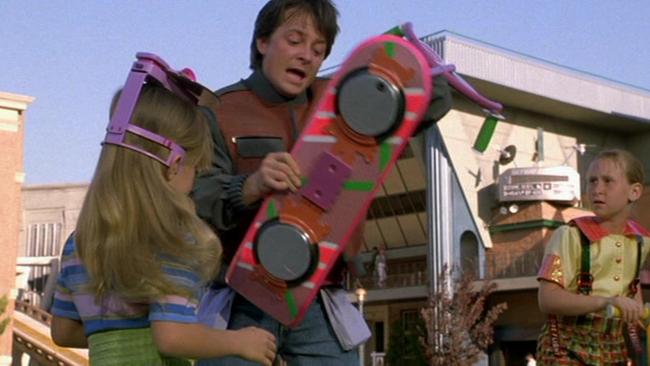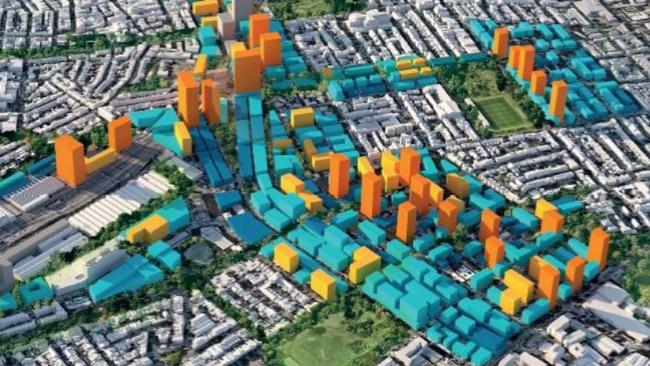NSW intergenerational report predicts the life of the average 20-year-old in 2056
BY THE middle of the century, life will be entirely different - and absolutely insane. This is what you can expect.

BY THE middle of the century, the average 20-year-old will be working part time, jumping into driverless cars, being cured for illnesses they didn’t even know they had and spending their spare time jogging around floating gardens in the sky dressed in “smart wear” that constantly monitors their health.
And the name “Zachary” is going to be all the rage.
That’s the prediction of the NSW Government as laid out in the latest intergenerational report, launched on Thursday. Published every five years, the report is essentially an educated guess as to what NSW will look like in four decades’ time.
The report says the population of Australia’s largest state will streak past 11 million people, and the economy will be worth some $1.3 trillion — that’s more than South Africa and the Philippines.
But the document also introduced us to three 20 year olds from different eras — Peter, Jessica and Zachary — to illustrate how we used to live, how we currently live and how we’ll live in the future.
You don’t want to be Peter. According to the report, he was one of only five million people in NSW in 1976. He earned just $178 a week, working in a washing machine factory and will die at 71. Most likely of a heart attack.

WORKING LESS, EARNING MORE
Jessica is a 20-year-old today and seems to be doing a bit better. She lives in a share house close to Sydney’s CBD and being a digital native is “constantly plugged into technology”.
For Jessica, fashion trends come and go at a pace that dizzies her parents. Like one-in-five people her age, she has holidayed overseas this year and working in a washing machine factory is an absolute no-no.
She’s going to be an entrepreneur or work in a start up after she finishes university. Kids can wait until her 30s and the grim reaper can wait until she’s 85.
But if Jessica waits until she is 40 to have children, as increasing numbers of people are today let alone in 20 years, she might produce a son called Zachary.
While completely fictional, the NSW Government thinks he could well be the most average 20-year-old in 2056. And Zach’s got it good.
“Life will be very different for Zachary. He will be part of an extremely tech-savvy generation, where the virtual and the real world operate together,” says the report.
“As part of a large and wealthy economy, Zachary will be earning more than previous generations and his standard of living will be almost two times higher than his grandparents.”
Somehow, he’s going to be doing all of this while working flexibly and possibly part time but, luckily, he’s working as a “freelance creative design teacher — a highly paid job”.
But, on the downside, Zach’s going to be teaching students until “well past the traditional retirement age”.

FLOATING PARK
He’ll live close to his work in an “energy efficient mixed use development”, which could well translate as one of a forest of new tower blocks close to the centre of Sydney. A prospect that is concerning some given the historic nature of many inner city suburbs and current infrastructure gaps.
Still, he can grab some fresh air in a “floating park” on top of his building. There’s no word on whether there’ll be any non-floating ground level parks left or whether they’re all buried under concrete.
“To get to work, Zachary will walk or take public transport. He will use one of the city’s public driverless electric cars to visit family in the suburbs or get out of the city on his days off.
“The automation of the driving process means that vehicles will operate in harmony and traffic flows more quickly, efficiently and safely.”
Bravely, for a dour government department, there are even some fashion predictions.
“While ‘activewear’ was fashionable in 2016, ‘smart-wear’ will be the reigning fashion trend in 2056. By embedding smart technology into clothing, Zachary monitors his own health and wellbeing for signs of stress or illness.”
Medical breakthroughs may even allow Zachary’s doctor to treat him for a cold before he starts showing symptoms.
“His healthcare will be customised to his lifestyle, medical history, genome and preferences.”

FISCAL GAP
On Thursday, NSW Treasurer Gladys Berejiklian said NSW was the best state in Australia.
“We are living longer, healthier lives and living standards are higher than ever before,” she said.
The problem for Zachary, however, is he is a best-case scenario for a future 20 year old in Sydney.
“We need to make sure we’re planning now to face the challenges of the future so NSW remains the best place to live and work,” said Ms Berejiklian.
One of those challenges is the looming “fiscal gap”. This is the difference between what the state brings in through revenue and what it spends.
Left unchecked, by the mid-2050s, this gap could be as much as 3.4 per cent. It sounds small but that difference could be $17 billion by that time.
“A fiscal gap of 3.4 per cent, if allowed to eventuate, would mean net debt would reach around 75 per cent of gross state products and net interest payments would make up nearly 20 per cent of total revenues,” the report states. “This is not sustainable.”
One of the chief reasons for the gap is an ageing population who use more resources but pay less tax.
“Obviously as we live longer there’ll be fewer people working full time to support those who are retired, so they’re interesting challenges to have,” Ms Berejiklian told the ABC.
“But they’re challenges that are completely manageable.”
Shadow Treasurer Ryan Park said the prospect of NSW not being able to fund its outgoings in decades to come was the government’s fault, reported Fairfax.
“The government has continued to overspend, with a milestone $10 billion blowout on its major projects,” he said.
To ensure Zach can enjoy his smart wear as he wanders around his floating gardens, the government says more migration will be needed, 1.8 million new homes will have to be built and innovation in the economy will have to be encouraged in order to boost jobs.
benedict.brook@news.com.au




